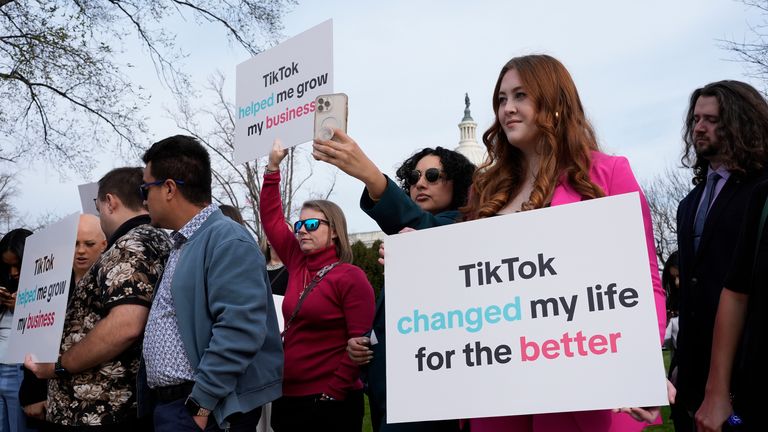It looks as if Joe Biden’s last day in office may be overshadowed by 170 million Americans opening their favourite app to be confronted with a blank screen – and blaming him for it.

If you think TikTok is messing with the heads of young people, consider what it’s been doing to America’s most powerful adults.
Last March, Congress voted overwhelmingly to ban the app on American soil unless a US buyer was found.
Despite claims or speculation that anyone from Elon Musk to MrBeast might be buyers, a deal has yet to emerge, with TikTok maintaining it’s not for sale.
Now, the US Supreme Court has dismissed legal challenges against the ban by the company and its users that said the new law would violate US free speech laws.
As things currently stand, the ban will take effect on January 19th, with TikTok saying the app will “go dark” in the US on Sunday.
But will it?
Outgoing US President Joe Biden and his successor Donald Trump, who both originally backed the ban, are siding against it.
Mr Biden has said he will not allow prosecutions for violations of the ban during his last 36 hours in office.
Mr Trump has indicated he will use an executive order to effectively suspend the ban until a US buyer is found.
You can almost hear the chuckles in the corridors of the National People’s Congress in Beijing.
Though owned by ByteDance, a Chinese company, TikTok has never been available in China.

It was the US Congress that decided the app was (delete as appropriate to your level of paranoia): distracting; influencing; spying on; brainwashing American youth.
Yet it looks as if Mr Biden’s last day in office may be overshadowed by 170 million, mostly young, Americans opening their favourite app to be confronted with a blank screen – and blaming him for it.
And Mr Trump celebrating his inauguration with the chief executive of TikTok Shou Zi Chew, but without his 14.8 million followers on TikTok.
Not to mention the seven million US businesses, according to TikTok, that profit from the platform having to hawk their wares on Facebook, Instagram and X and understandably wondering about the fairness of it all.
It’s looking as if America called TikTok’s bluff and it simply “swiped up”, threatening to take all the dances, trends, memes and marketing opportunities with it.
And America has flinched.

So what happens now?
TikTok may accept the reassurance of Mr Trump and keep the app running in the US. But it’s a legally precarious position for a company as it would still be in breach of US law.
According to incoming National Security Advisor Mike Waltz, team Trump will “keep TikTok alive… if there is a viable deal”.
But what does that even look like?
TikTok’s success is largely based on its technology.
Its algorithm is famous (or infamous, depending on whether you are a teenager or parent) in social media for its ability to feed users content that keeps them glued to the app.
A powerful AI curates the “For You” page that tailors videos, not just based on content a particular user views, but the faces, video length, text and topics it thinks they will like.
The company has key patents on automatic music generation and various filters that help users create videos.
While it has a hefty 170 million users in the US, it has more than 1.4 billion more worldwide.
Read more from Sky News:
Madeleine McCann suspect ‘won’t face charges for foreseeable’
Suspected burglar found hiding under bed
ByteDance has indicated that TikTok’s algorithm is not up for sale, nor, it’s reasonable to assume, are the rest of its patents.
Why would it give up all that for a fraction – albeit a lucrative one – of its overall market?
It seems unlikely a potential US buyer would pay much just to own TikTok’s platform and its list of US users if it had no way of offering them the same experience they enjoyed on the app before.
ByteDance (and the Chinese government which would have to approve the deal) could be persuaded to sell the app in its entirety to a US entity.
But the price is expected to be high: in the region of $100bn, which would be steep for even America’s richest tech titans.
That said, a deal could happen.
Mr Trump has announced he discussed TikTok on a call with China’s premier Xi Jinping.
Has the app become an unexpected pawn in US-China relations?
Keen to avoid punitive tariff’s threatened by Mr Trump, Beijing may be willing to let TikTok go.
Mr Trump may help close the deal, win favour with 170 million young voters, and gain powerful leverage over yet another social media platform.









